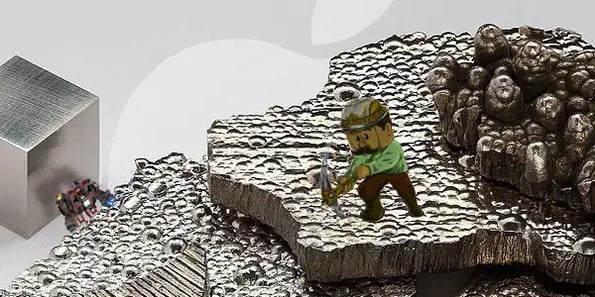The tech giant is on the hunt for a more direct supply of cobalt, a silver-hued metal used in the production of lithium ion batteries.

A spike in electric vehicles (which also use cobalt in their batteries) has stoked fears of a potential shortage of cobalt — and leaving nothing to chance, Apple is now looking to buy “several thousand metric tons” of the metal per year over the next 5 years, directly from mining companies.
The cobalt market is pretty cutthroat
While cobalt itself isn’t a rare resource, there are a limited number of mines producing it, creating a “supply-demand imbalance.”
This has sparked an all-out battle among big companies — BMW, Volkswagen, and Samsung included — to sign multi-year contracts that will allow them to scale their products in the coming years.
In the past 18 months, the price of cobalt has tripled, to $80k per metric ton — and cobalt usage in car batteries and smartphones is projected to increase from 55k tons (2017) to more than 325k tons by 2030.
Cobalt’s also got some ethical issues
Roughly two-thirds of the world’s cobalt comes from the Democratic Republic of Congo, where concerns have been raised over ethical mining.
A 2016 Amnesty International report determined that many of the big tech companies buying cobalt, including Apple, had been working with mines that relied on child labor.
In response, Apple published a “supplier responsibility guide” in which they promised to track their cobalt and work with only ethical suppliers.
Apple wants to be ethical — but mainly, they want to save $$$
By partnering directly with cobalt mines, Apple will have tighter control over the origins of its resources.
But it should also help them up the margins on iPhone sales: Buying in bulk should drive down their price per metric ton.
The average iPhone uses about 8 grams of cobalt — and the company sold 216m of them in 2017. So, even a little savings will go a long way.
